
For years after my last failed relationship, I would hoard lines from books that seemed to describe my ex perfectly and devastatingly. “It gratified him to feel like a desperate man,” Willa Cather writes of the surly husband, Frank, in O Pioneers! “His unhappy temperament was like a cage; he could never get out of it; and he felt that other people, his wife in particular, must have put him there.” Yes, yes, that was exactly how he was! I thought, scribbling down the quote.
Even the smallest moment in Anna Karenina, that breakup classic, could conjure visions of misery. Anna’s husband completely loses his powers of reasoning whenever he sees a woman cry: “The emotional distress wrought in Alexey Alexandrovich by tears on such occasions would find expression in a rapid loss of temper,” Leo Tolstoy writes. My own ex’s inability to handle emotions was all there. The great Russian novelist understood.
During a breakup, when being alone takes on a new rawness and intensity, the need to find your own life reflected in works of art is never greater. It can be easy to get lost in the particularities of your own doomed love and become convinced that no one’s ever gone through what you’re enduring. (Each unhappy family, etc.) But reading a book that manages to be eloquent about emotions that frequently render one inarticulate makes it possible to be gentle with yourself. The books below are both psychologically acute and genuinely insightful about the specific derangement of a separation. And despite their intimate understanding of the pain of heartbreak, they offer steadfast affirmation that love remains worth pursuing.
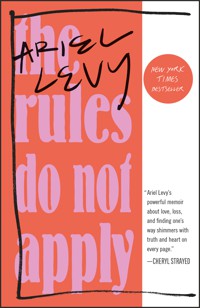
The Rules Do Not Apply, by Ariel Levy
The opening pages of Ariel Levy’s memoir are a dispatch from deep within a waking nightmare. “In the last few months, I have lost my son, my spouse, and my house,” she informs us. “My sorrow is so intense it often feels like it will flatten me.” What follows is an account of events so calamitous, they seem to Levy almost like divine retribution for a lifetime of heedless ambition: a gutting miscarriage on a reporting trip to Mongolia, her helpless period of obsession with a noxious ex and their ongoing affair, and the final, agonizing end of her marriage. Levy’s prose is immediate and often hilarious; she writes about Lucy, her spouse, with a regret that wafts off the page and sparks tears. “‘You’re the worst,’ I said once, and meant it,” she admits. “To my best friend in the world. To the person I had slept next to on a thousand naked nights, I said, You’re the worst.” As Levy moves toward a future that’s both hopeful and entirely up in the air, it’s hard not to feel tenderness—for her, of course, and for everyone whose life has been touched by grief.
[Read: This is your brain on heartbreak]
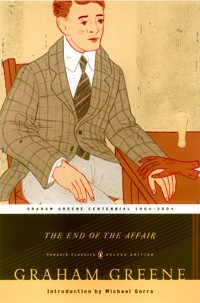
The End of the Affair, by Graham Greene
Maurice Bendrix just wants to know—urgently, jealously—what his lover, Sarah, has been up to. It’s been nearly two years since the night in June 1944 when they slept together and the Nazis bombed London. Afterward, Sarah wordlessly cut off their four-year affair. The book’s delightfully twisty plot is engrossing—Bendrix even hires a private detective, on the suggestion of Sarah’s husband, Henry, to tail her during her frequent disappearances. But make no mistake: Greene’s subject is love at its most tormented. Bendrix’s lovesickness is observed with heart-clenching accuracy, the way he waits for Sarah’s phone calls “with hope for company,” the way nights become unbearable—“A curtain would rise and the play would begin: always the same play, Sarah making love, Sarah with X, doing the same things we had done together,” Greene writes. And the novel’s most exquisite sequence comes when we finally find out where Sarah’s been. The relationship’s misunderstandings become almost excruciatingly poignant when viewed from the other side, and love, with its ecstasy and anguish, takes on all the sweep of religious experience.
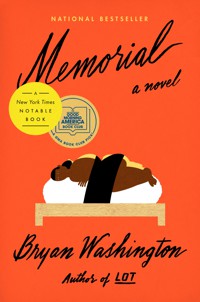
Memorial, by Bryan Washington
Mike and Benson’s four-year relationship is slowly but inexorably falling apart, and neither of them quite knows why, or how to stop it. Things become more complicated when Mike drops off his mother, Mitsuko, at their apartment to stay with Benson, the Black boyfriend she’s never met; then Mike flies to Japan to be with his estranged, dying father. In sections alternating between each man’s perspective, Mike and Benson go about their days in different countries: In Osaka, Mike learns the ropes at his father’s bar, while in Houston, Benson settles into a tentative coexistence with Mitsuko. But what preoccupies both men are the quotidian moments that constituted their life together, in a partnership whose future is now uncertain. Some of these memories—the “I love you”s, the fights they can seem to resolve only through sex—are so vividly observed, so convincing, that they had me dabbing away tears even during my second time reading the book. It’s an ode to a certain kind of romance, the knotted but enduring devotion between people who simply can’t make it work. “But that doesn’t diminish the love,” one character says. “It just changes forms.”
[Read: Talking about care and craft with Bryan Washington]
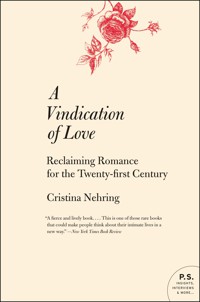
A Vindication of Love, by Cristina Nehring
“At its strongest and wildest and most authentic, love is a demon,” Nehring writes in this thrilling intellectual defense of romantic love. “It is a religion, a high-risk adventure, an act of heroism.” But nowadays, she contends, the experience has become trivial and vaguely embarrassing, stripped of its danger and “spiritual consequence.” Nehring convincingly dissects our culture’s misconceptions. Instead of blinding us, love actually sharpens the precision with which we see others as individuals. “Acute feelings attend acute intellects,” she writes, and who wouldn’t feel a bit of an ego boost, in the throes of a breakup, reading that sentence? The chapter on “love as failure” is also heartening: Measuring its success, she points out, is a limited approach that ignores the grandeur and meaning of the emotions involved. Not everyone will agree with every strand of what Nehring calls her “overtly polemical” argument, but the verve with which she makes it is hard to resist. Sprinkled throughout are lively recaps of Socratic dialogues and the 12th-century letters of Abelard and Héloïse; a spicy close reading of the Tristan and Iseult myth; and gripping capsule biographies of geniuses who loved with abandon, including Frida Kahlo, Emily Dickinson, Simone de Beauvoir, and Mary Wollstonecraft.
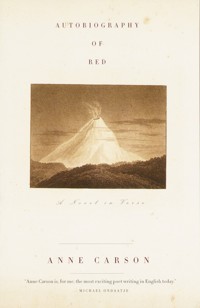
Autobiography of Red, by Anne Carson
In this “novel in verse” that reads like a strange and moving dream, Carson plucks Geryon, a red winged monster, out of the myth of Hercules (spelled as Herakles in the book) and nestles him into our world, alongside hockey practice, Fodor’s guides, and philosophy conferences. He’s a sensitive kid, prone to writing stories with sad endings—and at 14, he sees 16-year-old Herakles disembarking from a bus at 3 a.m. “The world poured back and forth between their eyes once or twice,” Carson writes, and Geryon is smitten. In the Greek legend, the tenth of Hercules’s famed labors is to kill Geryon and steal his herd of magical red cattle. Here, Herakles sweeps him off to his own grandmother’s house and just as suddenly breaks his heart. Eight years later, Geryon travels to Buenos Aires—he’s now a philosophy student who sprinkles bits of Heidegger (in the German!) into his postcards home—and runs into Herakles, along with a male companion, at a bookstore. What comes through, in this oblique book, is the particular angst of love distributed unequally, where one person simply cares far more than the other. One comes away yearning, like Geryon, for the ability to freeze fleeting moments or emotions in time, a desire sharpened by its impossibility.
[Read: The poetry of heartbreak]
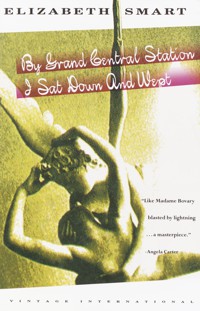
By Grand Central Station I Sat Down and Wept, by Elizabeth Smart
Much of the actual plot of By Grand Central Station, or at least some version of it, can be found in the author’s biography at the back of the book. The Canadian writer Elizabeth Smart happened across a volume of poetry in a London bookstore and fell so in love with its author, George Barker, that she paid for him and his wife to fly to the U.S. to meet her. The affair Smart and Barker began—one that eventually produced four children—forms the foundation of this brief, exalted book, originally published in 1945. And yet, in the novel, what happens between them is almost beside the point. We barely see the narrator’s lover; crucial developments are merely implied. Smart writes instead on the level of legend, religion, and pure feeling, and her prose has its own logic. Ten well-formed sections chart the narrator’s emotional seasons: the thrill and guilt of liaisons amid “cathedral redwoods,” her parents’ and the wider world’s hostility to headlong love, and histrionic yet all-too-relatable despair (“I wonder why no one has noticed I am dead and taken the trouble to bury me”). But throughout, Smart’s belief in love is unshakeable and contagious. “In all states of being, in all worlds,” she writes, “this is all there is.”
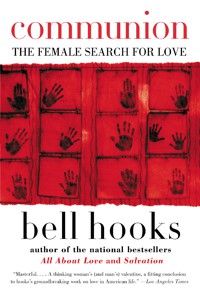
Communion, by bell hooks
The third entry in a trilogy that includes the better-known All About Love, Communion focuses on hooks’s personal experiences, both as a feminist college student against the backdrop of 1970s women’s liberation and as a woman with male partners. “Before I reached the age of forty, I never even considered that my relationships did not last because I did not know enough about love,” she writes. It was only in midlife, at the end of a 15-year partnership, that she began to think critically about her own relationship with intimacy, and to clearly see her partner’s shortcomings as well as her own. Communion compiles the insights she gained after this period of self-inquiry. The search for love is one of the most important quests of a person’s life, hooks maintains, and her firm optimism that everyone can cultivate a connection filled with mutual growth and openness inspires hope. “Leaving this relationship was not about giving up on love,” she concludes. “It was the gesture that would set me free to really search for love—the gesture that would allow me to love again.” The prospect of creating a bond that lives up to hooks’s uncompromising vision can be daunting. This book will make you want to try.
When you buy a book using a link on this page, we receive a commission. Thank you for supporting The Atlantic.







